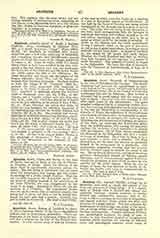

Anatolius, Saint, Bishop of Laodicea in Syria, d. 283; a foremost scholar of his day in the physical sciences and in Aristotelean philosophy. There are fragments of ten books on arithmetic written by him, and also a treatise on the time of the Paschal celebration. A very curious story is told by Eusebius of the way in which Anatolius broke up a rebellion in a part of Alexandria known as the Bruchium. It was held by the forces of Zenobia, and being strictly beleaguered by the Romans was in a state of starvation. The saint, who was living in the Bruchium at the time, made arrangements with the besiegers to receive all the women and children, as well as the old and infirm, continuing at the same time to let as many as wished profit by the means of escaping. It broke up the defense and the rebels surrendered. It was a patriotic action on the part of the saint, as well as one of great benevolence, in saving so many innocent victims from death. In going to Laodicea he was seized by the people and made bishop. Whether his friend Eusebius had died, or whether they both occupied the see together, is a matter of much discussion. The question is treated at length in the Bollandists. His feast, like that of his namesake the Patriarch of Constantinople, is kept on July 3.
T. J. CAMPBELL

